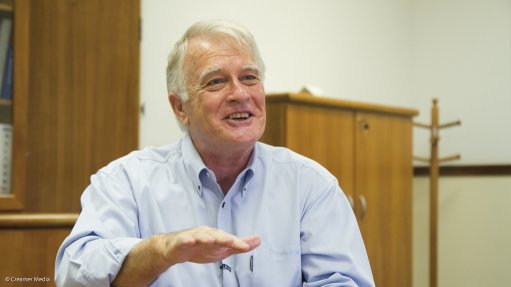
Rod Pickering, chair of Centre for Mechnised Mining Systems
Photo by: Duane Daws
JOHANNESBURG (miningweekly.com) – It was “absolutely unacceptable” for the South African mining industry to continue mining its hard-rock, narrow-reef resources conventionally, Centre for Mechanised Mining Systems Steering Committee chairperson Rod Pickering said on Monday.
Pickering, who was speaking to Mining Weekly Online at the centre’s base at the University of the Witwatersrand, warned that the country would end up with closed gold and platinum mines if it failed to introduce new ways of mining.
“Hard-rock, narrow-reef mining has to change,” Pickering said in the attached video interview.
South Africa could not afford to continue the way it was mining its precious metals currently.
“It’s absolutely unacceptable. We’re going to end up having none of these conventional mines left,” said Pickering, who spent 20 years with the now-defunct Chamber of Mines Research Organisation (Comro), where he ran the stoping-technology laboratory, which was Comro’s focus on narrow-reef, hard-rock mines.
His comments follow those of veteran research commentator Dr R E (Robbie) Robinson, who has called for the introduction of selected blast mining (SBM) in South Africa’s narrow-reef stopes as a way of boosting the struggling sector.
A mining company has engaged Pickering in a project that combines SBM with mechanised equipment in the mining of a 400-mm-thick reef.
“This enables us to get the best of both worlds,” he told Mining Weekly Online.
The project involves carrying out long-hole drilling and using SBM to blast the waste material into the back of the stope to form a dense backfill.
“It’s blasted backfill that we’re going to achieve with this, and we’re just going to pop the reef up,” he said.
A mining services firm has been carrying out SBM with hand drilling for several years.
“We’re now taking it a step further and saying we want to do it as a fully mechanised process,” he said.
In this way the benefit of not pulverising the rock, as advocated repeatedly by Robinson, will be obtained.
The current method of blasting scatters the finely divided gold and platinum ore far and wide and lowers the rate of precious-metals recovery significantly.
SBM shock fractures the rock instead of losing significant amounts of it in high energy explosions.
Under Pickering’s scenario, dangerous stopes become no-go areas.
“No people go in the stope. They go into the developments on the side,” he said.
Those working would be operating equipment, which had the potential to overcome the current strikes over pay issues.
If the machines helped the mineworkers to produce more ounces, then higher pay would be economically feasible.
Pickering is not a believer in the answer being in new technologies, which take decades to develop.
“It’s not as if we are going to pull some bunny out of a hat and suddenly say we can go in there and do laser rock cutting,” he said, adding that long-hole drilling was tried and tested technology and impressive blast initiation systems were available for use.
The trick was to package known technologies together to achieve lower costs and greater safety and failure to do so would seriously curtail the longevity of hard-rock, narrow-reef mining locally.